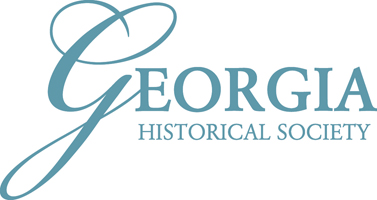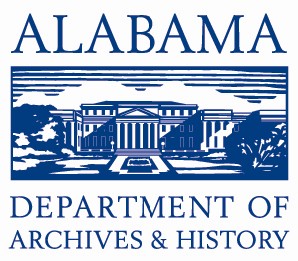from May. 6, 1865
Savannah Daily Herald
-
Full Title
Savannah Daily Herald
-
Description
This is the front page of the Savannah Daily Herald newspaper dedicated to the assassination of President Abraham Lincoln and shooting of John Wilkes Booth. Articles titles include: "The Assassination", "The Grand Funeral Pageant in New York City…", and "Another Account of the Shooting of Booth".
-
Source
Georgia Historical Society newspaper collection.
-
Rights
Use of this item for research, teaching and private study is permitted with proper citation and attribution, as defined here. Reproduction of this item for publication, broadcast or commercial use requires written permission. For permission, please contact the Georgia Historical Society Research Center at library@georgiahistory.com.
-
Tags
-
Cite this Item
Savannah Daily Herald. "Savannah Daily Herald". S.W. Mason & Co.. Remembering Lincoln. Web. Accessed October 29, 2025. https://rememberinglincoln.fords.org/node/258
from May. 6, 1865
Savannah Daily Herald
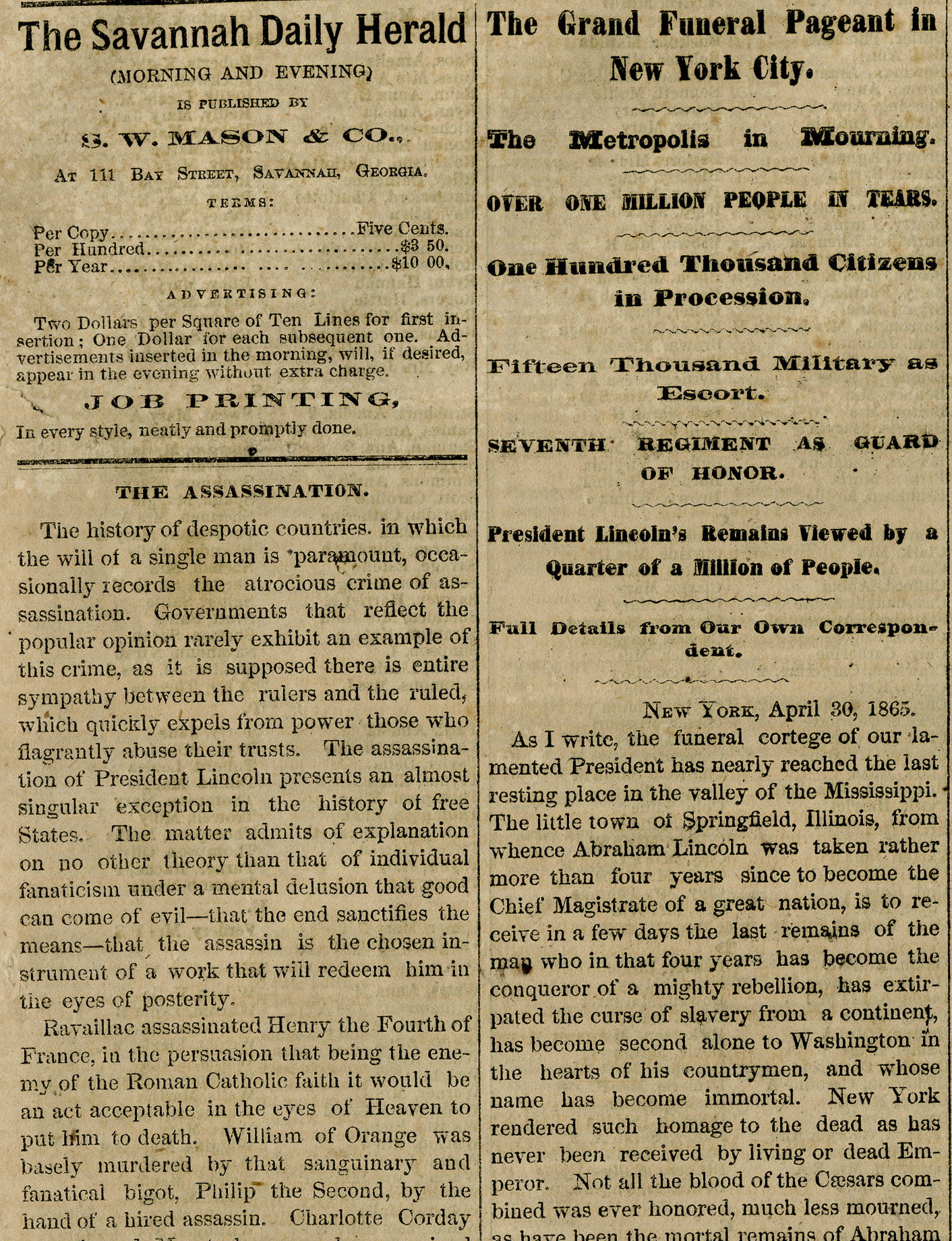
-
Description
This is the front page of the Savannah Daily Herald newspaper dedicated to the assassination of President Abraham Lincoln and shooting of John Wilkes Booth. Articles titles include: "The Assassination", "The Grand Funeral Pageant in New York City…", and "Another Account of the Shooting of Booth".
-
Source
Georgia Historical Society newspaper collection.
-
Rights
Use of this item for research, teaching and private study is permitted with proper citation and attribution, as defined here. Reproduction of this item for publication, broadcast or commercial use requires written permission. For permission, please contact the Georgia Historical Society Research Center at library@georgiahistory.com.
-
Creator
Savannah Daily Herald
-
Publisher
S.W. Mason & Co.
-
Date
May 6, 1865
from Apr. 20, 1865
The assassination
-
Full Title
The assassination
-
Description
This clipping includes news dispatches regarding the identification of John Wilkes Booth as one of the assassins and the official announcement of President Abraham Lincoln's death. Printed "from the Herald Extra, of Yesterday".
-
Source
Georgia Historical Society newspaper collection
-
Rights
Use of this item for research, teaching and private study is permitted with proper citation and attribution, as defined here. Reproduction of this item for publication, broadcast or commercial use requires written permission. For permission, please contact the Georgia Historical Society Research Center at library@georgiahistory.com.
-
Tags
-
Cite this Item
Savannah Republican. "The assassination". Remembering Lincoln. Web. Accessed October 29, 2025. https://rememberinglincoln.fords.org/node/256
from Apr. 20, 1865
The assassination
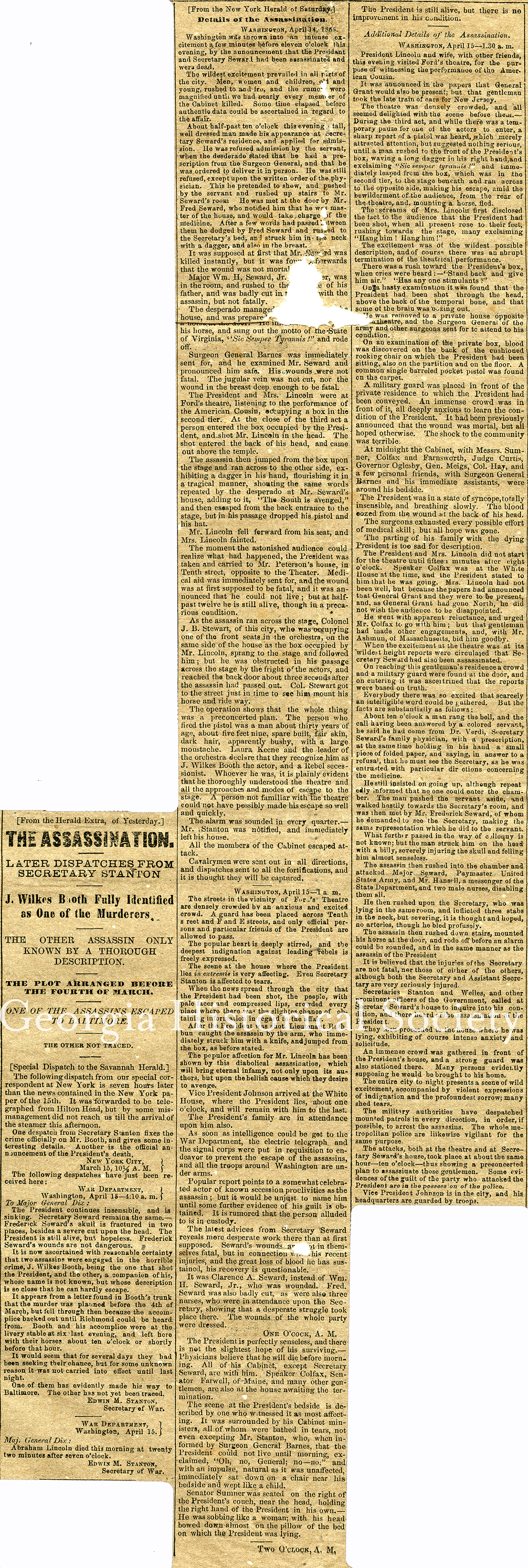
-
Description
This clipping includes news dispatches regarding the identification of John Wilkes Booth as one of the assassins and the official announcement of President Abraham Lincoln's death. Printed "from the Herald Extra, of Yesterday".
-
Source
Georgia Historical Society newspaper collection
-
Rights
Use of this item for research, teaching and private study is permitted with proper citation and attribution, as defined here. Reproduction of this item for publication, broadcast or commercial use requires written permission. For permission, please contact the Georgia Historical Society Research Center at library@georgiahistory.com.
-
Creator
Savannah Republican
-
Date
April 20, 1865
from Apr. 15, 1865
Detroit Tribune, Vol. XXIX, No. 234
-
Full Title
Detroit Tribune, Vol. XXIX, No. 234
-
Description
Front page of the Saturday, April 15, 1865 evening edition of the Detroit Tribune mounted to a linen backing. The page is dominated by the news of the assassination of President Abraham Lincoln, and the attempted assassination of Secretary of State William H. Seward, the latter of which it initially falsely reports as succeeding. The paper also includes a message from Detroit mayor Kirkland C. Barker, who requested that businesses be closed, all bells in the city be tolled for the hour between noon and one o'clock, and that the citizens gather for a meeting at City Hall at three o'clock.
-
Source
-
Rights
Use of this item for research, teaching and private study is permitted with proper citation and attribution, as defined here. Reproduction of this item for publication, broadcast or commercial use requires written permission. For permission, please contact The Detroit Historical Society.
-
Tags
-
Cite this Item
Detroit Tribune. "Detroit Tribune, Vol. XXIX, No. 234". Detroit Tribune. Remembering Lincoln. Web. Accessed October 29, 2025. https://rememberinglincoln.fords.org/node/252
from Apr. 15, 1865
Detroit Tribune, Vol. XXIX, No. 234

-
Description
Front page of the Saturday, April 15, 1865 evening edition of the Detroit Tribune mounted to a linen backing. The page is dominated by the news of the assassination of President Abraham Lincoln, and the attempted assassination of Secretary of State William H. Seward, the latter of which it initially falsely reports as succeeding. The paper also includes a message from Detroit mayor Kirkland C. Barker, who requested that businesses be closed, all bells in the city be tolled for the hour between noon and one o'clock, and that the citizens gather for a meeting at City Hall at three o'clock.
-
Source
-
Rights
Use of this item for research, teaching and private study is permitted with proper citation and attribution, as defined here. Reproduction of this item for publication, broadcast or commercial use requires written permission. For permission, please contact The Detroit Historical Society.
-
Creator
Detroit Tribune
-
Publisher
Detroit Tribune
-
Date
April 15, 1865
-
Material
Newspaper
from Apr. 14, 1866
"Robert Lincoln - Gossip in High Life."
-
Full Title
"Robert Lincoln - Gossip in High Life."
-
Description
Report from the Washington correspondent at the Nashville Republican Banner, discussing the efforts of President Lincoln’s son to secure a political position for the father of a woman he intended to marry. Published in the Montgomery Daily Mail on April 14, 1866.
-
Source
Excerpt from the Montgomery Daily Mail, item number ADVCOL42. Catalog record for this title is available here.
-
Rights
Use of this item for research, teaching and private study is permitted with proper citation and attribution, as defined here. Reproduction of this item for publication, broadcast or commercial use requires written permission. For permission, please contact the Alabama Department of Archives and History.
-
Tags
-
Cite this Item
Montgomery Daily Mail. ""Robert Lincoln - Gossip in High Life."". Remembering Lincoln. Web. Accessed October 29, 2025. https://rememberinglincoln.fords.org/node/237
from Apr. 14, 1866
"Robert Lincoln - Gossip in High Life."
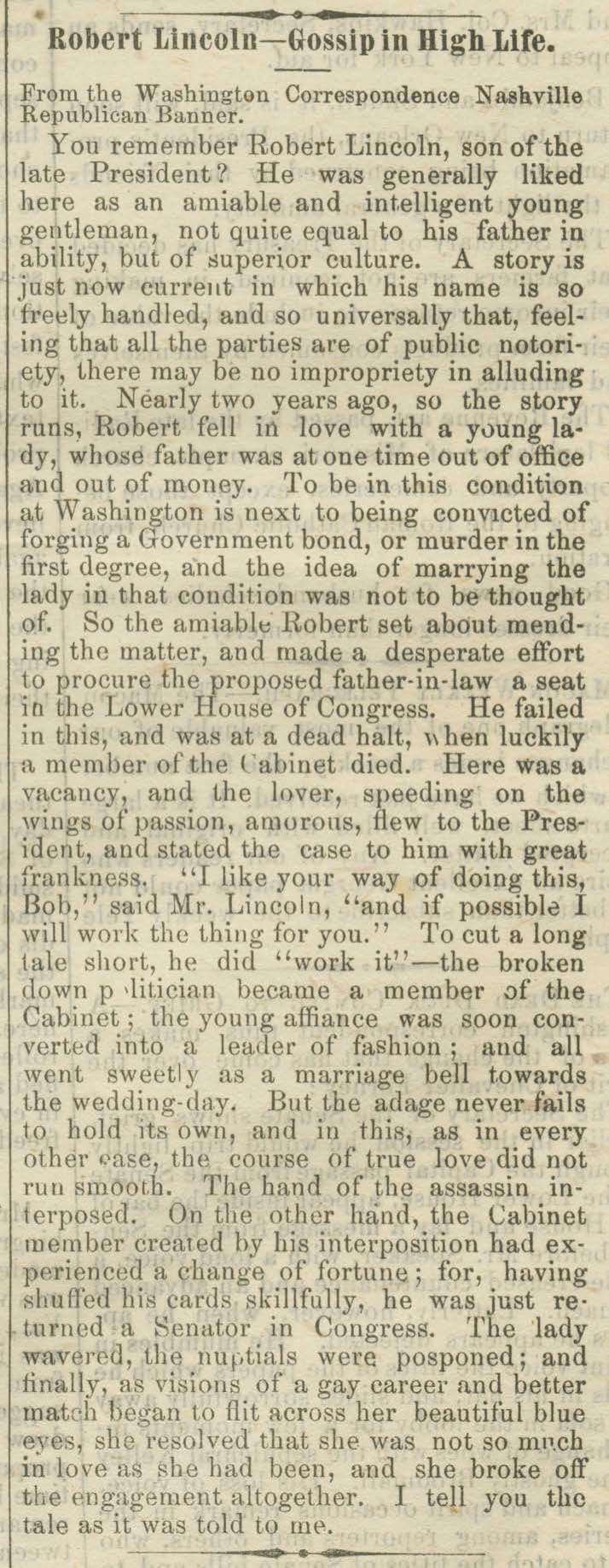
-
Description
Report from the Washington correspondent at the Nashville Republican Banner, discussing the efforts of President Lincoln’s son to secure a political position for the father of a woman he intended to marry. Published in the Montgomery Daily Mail on April 14, 1866.
-
Source
Excerpt from the Montgomery Daily Mail, item number ADVCOL42. Catalog record for this title is available here.
-
Rights
Use of this item for research, teaching and private study is permitted with proper citation and attribution, as defined here. Reproduction of this item for publication, broadcast or commercial use requires written permission. For permission, please contact the Alabama Department of Archives and History.
-
Creator
Montgomery Daily Mail
-
Date
April 14, 1866
from Feb. 23, 1866
"Lincoln and Palmerston."
-
Full Title
"Lincoln and Palmerston."
-
Description
Editorial criticizing the memorial address delivered by George Bancroft on the birthday of the late President Lincoln. In particular, the piece scoffs at the comparison drawn between Lincoln and Lord Palmerston of Great Britain: “This comparison is not suggested to Mr. Bancroft by the characters of the two men, but by their dying the same year. Had it not been for this insignificant chronological accident, it could not have occurred even to him. It affords, however, a characteristic illustration of his prurient tendency to desert truth and nature in pursuit of turgid literary clap-trap.” Originally published in The New York World; reprinted in the Montgomery Daily Mail on February 23, 1866.
-
Source
Excerpt from the Montgomery Daily Mail, item number ADVCOL42. Catalog record for this title is available here.
-
Rights
Use of this item for research, teaching and private study is permitted with proper citation and attribution, as defined here. Reproduction of this item for publication, broadcast or commercial use requires written permission. For permission, please contact the Alabama Department of Archives and History.
-
Tags
-
Cite this Item
Montgomery Daily Mail. ""Lincoln and Palmerston."". Remembering Lincoln. Web. Accessed October 29, 2025. https://rememberinglincoln.fords.org/node/235
from Feb. 23, 1866
"Lincoln and Palmerston."
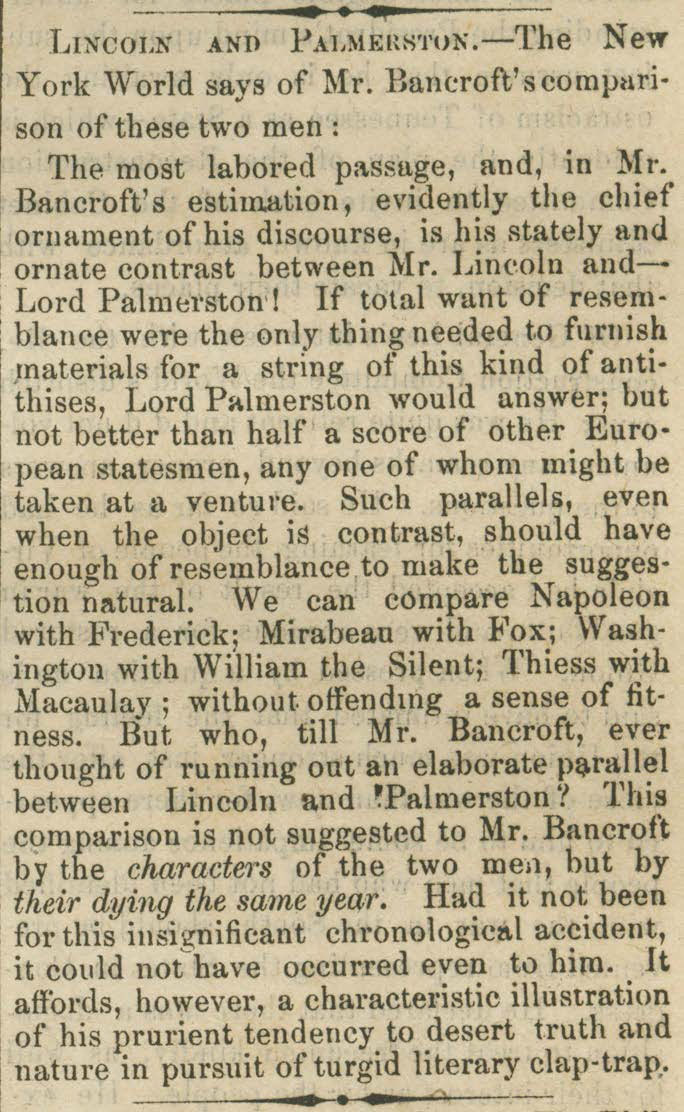
-
Description
Editorial criticizing the memorial address delivered by George Bancroft on the birthday of the late President Lincoln. In particular, the piece scoffs at the comparison drawn between Lincoln and Lord Palmerston of Great Britain: “This comparison is not suggested to Mr. Bancroft by the characters of the two men, but by their dying the same year. Had it not been for this insignificant chronological accident, it could not have occurred even to him. It affords, however, a characteristic illustration of his prurient tendency to desert truth and nature in pursuit of turgid literary clap-trap.” Originally published in The New York World; reprinted in the Montgomery Daily Mail on February 23, 1866.
-
Source
Excerpt from the Montgomery Daily Mail, item number ADVCOL42. Catalog record for this title is available here.
-
Rights
Use of this item for research, teaching and private study is permitted with proper citation and attribution, as defined here. Reproduction of this item for publication, broadcast or commercial use requires written permission. For permission, please contact the Alabama Department of Archives and History.
-
Creator
Montgomery Daily Mail
-
Date
February 23, 1866
from Feb. 22, 1866
"A French Criticism on the Bancroft Oration."
-
Full Title
"A French Criticism on the Bancroft Oration."
-
Description
Excerpts from a French newspaper, criticizing the memorial address delivered by George Bancroft on the birthday of the late President Lincoln. Published in the Montgomery Daily Mail on February 22, 1866.
-
Source
Excerpt from the Montgomery Daily Mail, item number ADVCOL42. Catalog record for this title is available here.
-
Rights
Use of this item for research, teaching and private study is permitted with proper citation and attribution, as defined here. Reproduction of this item for publication, broadcast or commercial use requires written permission. For permission, please contact the Alabama Department of Archives and History.
-
Tags
-
Cite this Item
Montgomery Daily Mail. ""A French Criticism on the Bancroft Oration."". Remembering Lincoln. Web. Accessed October 29, 2025. https://rememberinglincoln.fords.org/node/234
from Feb. 22, 1866
"A French Criticism on the Bancroft Oration."
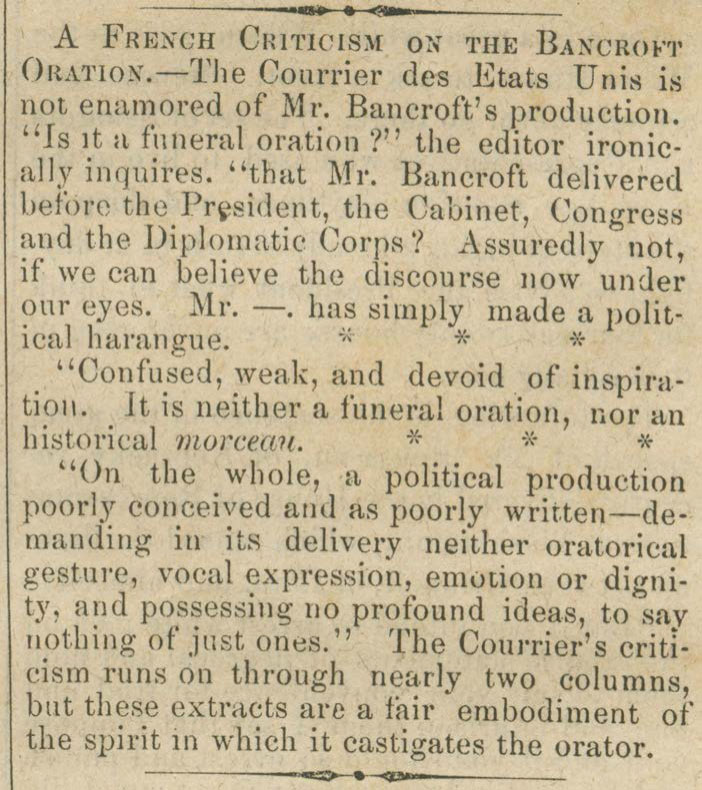
-
Description
Excerpts from a French newspaper, criticizing the memorial address delivered by George Bancroft on the birthday of the late President Lincoln. Published in the Montgomery Daily Mail on February 22, 1866.
-
Source
Excerpt from the Montgomery Daily Mail, item number ADVCOL42. Catalog record for this title is available here.
-
Rights
Use of this item for research, teaching and private study is permitted with proper citation and attribution, as defined here. Reproduction of this item for publication, broadcast or commercial use requires written permission. For permission, please contact the Alabama Department of Archives and History.
-
Creator
Montgomery Daily Mail
-
Date
February 22, 1866
from Feb. 16, 1866
Commentary on George Bancroft's memorial address
-
Full Title
Brief news item about the memorial address delivered by George Bancroft on Abraham Lincoln’s birthday in 1866.
-
Description
The address, delivered on February 12, discussed the late president’s plans for the suffrage of African Americans: “…Mr. Lincoln’s wish made only three days before his death, that the elective franchise should only be conferred on very intelligent colored men and those that had served in the U.S. army as soldiers, but that it should be done by the States themselves, and that he never harbored the thought of exacting it from a new government as a condition of its recognition.” Published in the Montgomery Daily Mail on February 16, 1866.
-
Source
Excerpt from the Montgomery Daily Mail, item number ADVCOL42. Catalog record for this title is available here.
-
Rights
Use of this item for research, teaching and private study is permitted with proper citation and attribution, as defined here. Reproduction of this item for publication, broadcast or commercial use requires written permission. For permission, please contact the Alabama Department of Archives and History.
-
Tags
-
Cite this Item
Montgomery Daily Mail. "Brief news item about the memorial address delivered by George Bancroft on Abraham Lincoln’s birthday in 1866.". Remembering Lincoln. Web. Accessed October 29, 2025. https://rememberinglincoln.fords.org/node/232
from Feb. 16, 1866
Brief news item about the memorial address delivered by George Bancroft on Abraham Lincoln’s birthday in 1866.
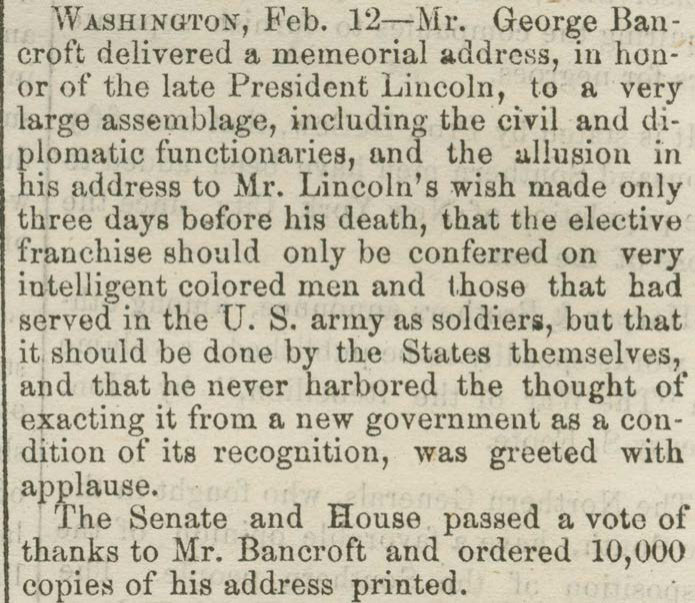
-
Description
The address, delivered on February 12, discussed the late president’s plans for the suffrage of African Americans: “…Mr. Lincoln’s wish made only three days before his death, that the elective franchise should only be conferred on very intelligent colored men and those that had served in the U.S. army as soldiers, but that it should be done by the States themselves, and that he never harbored the thought of exacting it from a new government as a condition of its recognition.” Published in the Montgomery Daily Mail on February 16, 1866.
-
Source
Excerpt from the Montgomery Daily Mail, item number ADVCOL42. Catalog record for this title is available here.
-
Rights
Use of this item for research, teaching and private study is permitted with proper citation and attribution, as defined here. Reproduction of this item for publication, broadcast or commercial use requires written permission. For permission, please contact the Alabama Department of Archives and History.
-
Creator
Montgomery Daily Mail
-
Date
February 16, 1866
from Apr. 15, 1866
"The Murder of President Lincoln."
-
Full Title
"The Murder of President Lincoln."
-
Description
Report published a year after the assassination of Abraham Lincoln, suggesting that John Wilkes Booth was not the real murderer of the president. It also speculates that Booth was not killed in Virginia but rather fled the country after the event. The piece, printed in The Selma Morning Times on April 15, 1866, was originally submitted by a Washington correspondent of the New Orleans Picayune.
-
Source
Excerpt from the The Selma Morning Times, item number 24.0046. Catalog record for this title is available here.
-
Rights
Use of this item for research, teaching and private study is permitted with proper citation and attribution, as defined here. Reproduction of this item for publication, broadcast or commercial use requires written permission. For permission, please contact the Alabama Department of Archives and History.
-
Tags
-
Cite this Item
The Selma Morning Times. ""The Murder of President Lincoln."". Remembering Lincoln. Web. Accessed October 29, 2025. https://rememberinglincoln.fords.org/node/229
from Apr. 15, 1866
"The Murder of President Lincoln."

-
Description
Report published a year after the assassination of Abraham Lincoln, suggesting that John Wilkes Booth was not the real murderer of the president. It also speculates that Booth was not killed in Virginia but rather fled the country after the event. The piece, printed in The Selma Morning Times on April 15, 1866, was originally submitted by a Washington correspondent of the New Orleans Picayune.
-
Source
Excerpt from the The Selma Morning Times, item number 24.0046. Catalog record for this title is available here.
-
Rights
Use of this item for research, teaching and private study is permitted with proper citation and attribution, as defined here. Reproduction of this item for publication, broadcast or commercial use requires written permission. For permission, please contact the Alabama Department of Archives and History.
-
Creator
The Selma Morning Times
-
Date
April 15, 1866
from Apr. 29, 1865
"The Sad Rites of Yesterday"
-
Full Title
The Sad Rites of Yesterday
-
Description
The Cleveland Morning Leader newspaper issued this editorial in its April 29, 1865 edition, the day after Lincoln's funeral train had stopped in the city and the body of the slain President was on display for the citizens of the city and surrounding towns to view the President and pay their respect. The editorial paints a clear picture of the mood of the citizenry of one of the Northern states after losing the man who guided the nation through the trauma of the Civil War. Lincoln had won the Presidency with the strong support of Cleveland and the State of Ohio both in 1860 and again in 1864. Cleveland was the largest city in the old Western Reserve area of Ohio, with strong abolitionist feelings dating back to the ordinances of the old Northwest Territory that prohibited slavery. The new Republican Party was especially strong in Cleveland.
-
Transcription
The Sad Rites of Yesterday
Friday, Feb. 15th, 1861, the newly elected President, Abraham Lincoln, passed through Cleveland, on his way from his modest home in Springfield, Illinois, to assume control of the national government. Friday, April 28th, 1865, his dead body is brought back to us, over the same route which he traversed in his former journey, followed by mourners to the home which he left four years ago. What a chasm lies between two days! What volumes of history are embraced in the years which seperate them! What convulsions, what changes, what growth, what enlightenment have they wrought in the heart of the nation! A most striking illustration is found in the contrast which exists between this funeral procession and the triumphal progress. When Abraham Lincoln first visited Cleveland he was personally a stranger to us. We had known him only briefly and imperfectly, and though the sanctity of the great office to which he had been elected invested him with dignity and interest, he was still looked upon as a party candidate, place in the Presidential chair by a singular succession of chances, and possessing no remarkable ability or attainments. Now his murdered corpse comes back to us, followed by a nation of mourners, and city after city, along the line of the grand funeral procession, join, with a unanimity as remarkable as it is unprecedented, in demonstrations of affection and grief for the dead. After four years of toil and suffering and sacrifice in the cause of the nation, he had earned so fully the confidence and esteem of the entire people that they mourn for him with one accord as for a father murdered. He has fallen in the summit and culmination of his glory. But one thing was wanting to make his memory something hallowed and immortal. That was martyrdom, and the bullet of the assassin has rounded and perfected his career, while apparently leaving it incomplete and blank.
The grand funeral pageant, of whose progress through the East we have read with a sad interest, has passed through Cleveland. In another column we give a full description of the ceremonies of the day. We merely desire in this place to call attention to the general - the universal-display of sympathy with the character of the day. The whole city, aye and the whole people of Northern Ohio, united in this our last and most palpable demonstration of mourning. This fact was legible everywhere, not more in crape-shrouded blocks, the draped and decorated catafalque, and the imposing procession, than in the quiet sadness and solemnity of every face, the good-order and decorum everywhere prevalent, and the unanimous suspension of other pursuits to join more fully in the general mourning. The day will live to the end of life in the memory of the people who witnessed it, and fifty years from now the children of today will tell their grandchildren how they looked upon the dead face of the Good President, and how they saw him borne upon his funeral way amid the tears of sorrowing millions, while the world looked on in reverent awe!
-
Source
www.wrhs.org
-
Rights
Permission for personal or research use; publication or reproduction requires written permission from the Western Reserve Historical Society.
-
Tags
-
Cite this Item
Cleveland Morning Leader. "The Sad Rites of Yesterday". Cleveland Morning Leader. Remembering Lincoln. Web. Accessed October 29, 2025. https://rememberinglincoln.fords.org/node/226
-
Creator
Cleveland Morning Leader
-
Publisher
Cleveland Morning Leader
-
Date
April 29, 1865
from Apr. 29, 1865
The Sad Rites of Yesterday

-
Description
The Cleveland Morning Leader newspaper issued this editorial in its April 29, 1865 edition, the day after Lincoln's funeral train had stopped in the city and the body of the slain President was on display for the citizens of the city and surrounding towns to view the President and pay their respect. The editorial paints a clear picture of the mood of the citizenry of one of the Northern states after losing the man who guided the nation through the trauma of the Civil War. Lincoln had won the Presidency with the strong support of Cleveland and the State of Ohio both in 1860 and again in 1864. Cleveland was the largest city in the old Western Reserve area of Ohio, with strong abolitionist feelings dating back to the ordinances of the old Northwest Territory that prohibited slavery. The new Republican Party was especially strong in Cleveland.
-
Source
www.wrhs.org
-
Rights
Permission for personal or research use; publication or reproduction requires written permission from the Western Reserve Historical Society.
-
Creator
Cleveland Morning Leader
-
Publisher
Cleveland Morning Leader
-
Date
April 29, 1865
from Apr. 28, 1865
"The Face of the Dead"
-
Full Title
The Face of the Dead
-
Description
Lincoln was the first President of the United States to be embalmed. His funeral and viewing was done with an open casket, so that in Washington, D.C., and at other stops along the route of the funeral train, citizens could view his body. the funeral train stopped in Cleveland, Ohio on April 28, two weeks after the assassination, where for the first time the casket and catafalque were displayed outdoors. Over 60,000 citizens were reported to have viewed the body during that single day. The next day the Cleveland Morning Leader newspaper reported on the funeral events, including this short article about the countenance of the face of the President. While there are many photographs of the catafalque on display in Cleveland's Public Square, no photographs of Lincoln's body were allowed, so that this direct report provides what we know of how he looked two weeks after his death.
-
Source
www.wrhs.org
-
Rights
Permission for personal or research use; publication or reproduction requires written permission of the Western Reserve Historical Society.
-
Tags
-
Cite this Item
Cleveland Morning Leader newspaper. "The Face of the Dead". Remembering Lincoln. Web. Accessed October 29, 2025. https://rememberinglincoln.fords.org/node/225
-
Creator
Cleveland Morning Leader newspaper
-
Date
April 28, 1865
from Apr. 28, 1865
The Face of the Dead
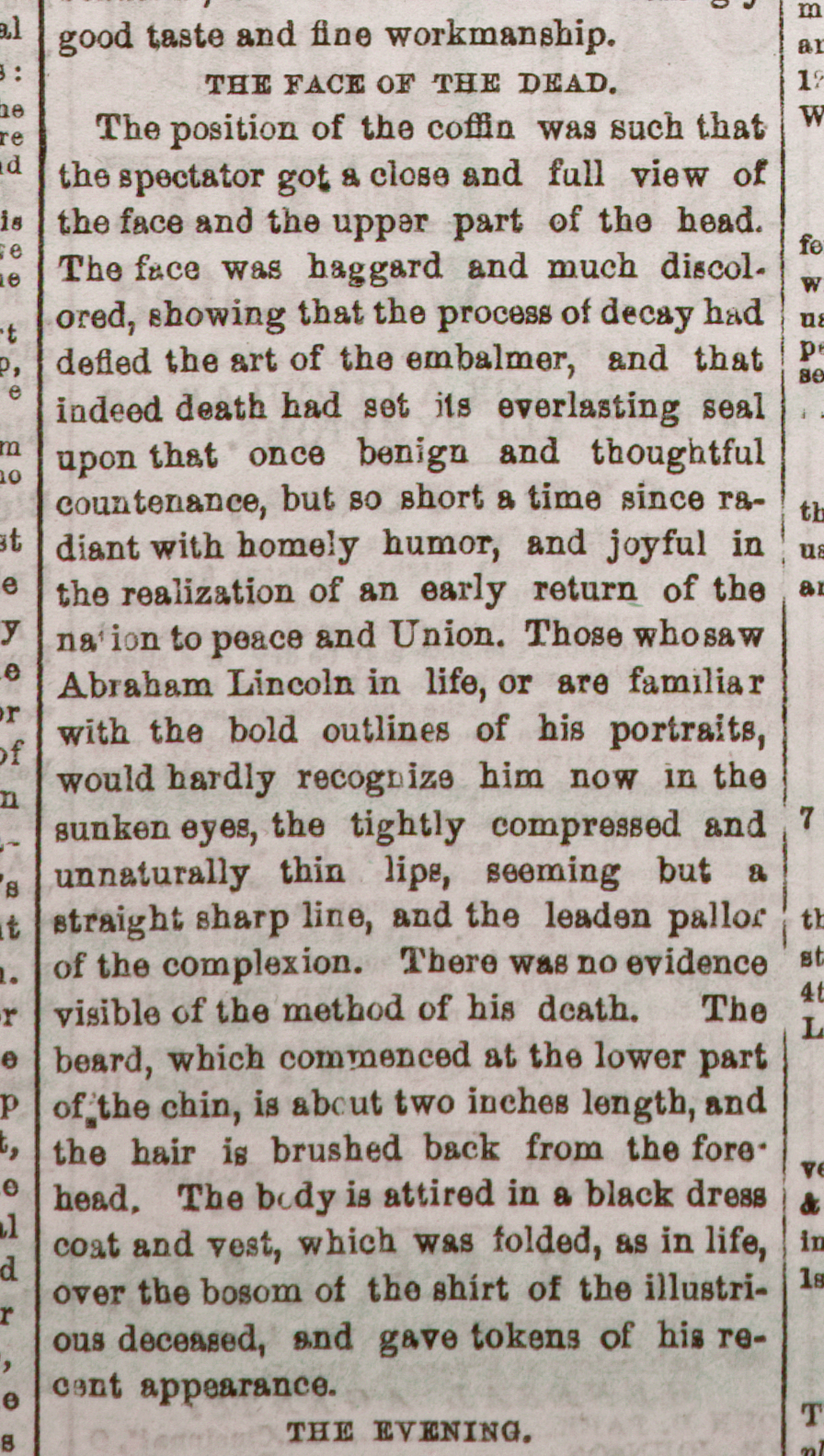
-
Description
Lincoln was the first President of the United States to be embalmed. His funeral and viewing was done with an open casket, so that in Washington, D.C., and at other stops along the route of the funeral train, citizens could view his body. the funeral train stopped in Cleveland, Ohio on April 28, two weeks after the assassination, where for the first time the casket and catafalque were displayed outdoors. Over 60,000 citizens were reported to have viewed the body during that single day. The next day the Cleveland Morning Leader newspaper reported on the funeral events, including this short article about the countenance of the face of the President. While there are many photographs of the catafalque on display in Cleveland's Public Square, no photographs of Lincoln's body were allowed, so that this direct report provides what we know of how he looked two weeks after his death.
-
Source
www.wrhs.org
-
Rights
Permission for personal or research use; publication or reproduction requires written permission of the Western Reserve Historical Society.
-
Creator
Cleveland Morning Leader newspaper
-
Date
April 28, 1865
